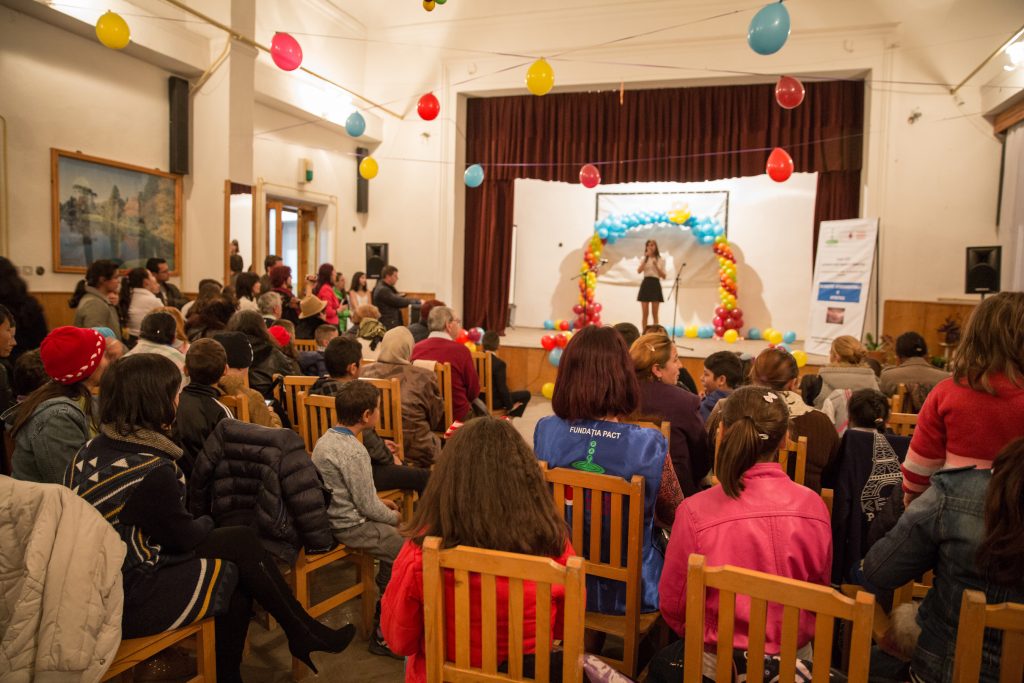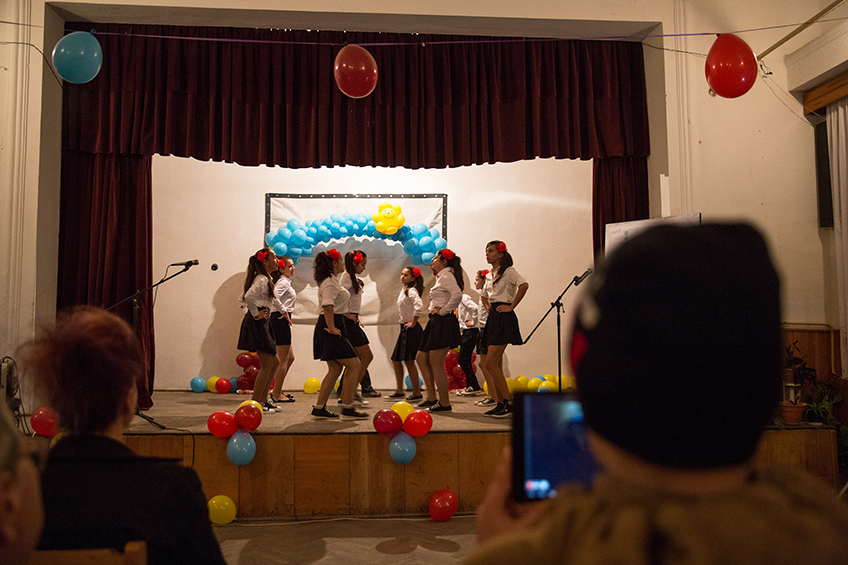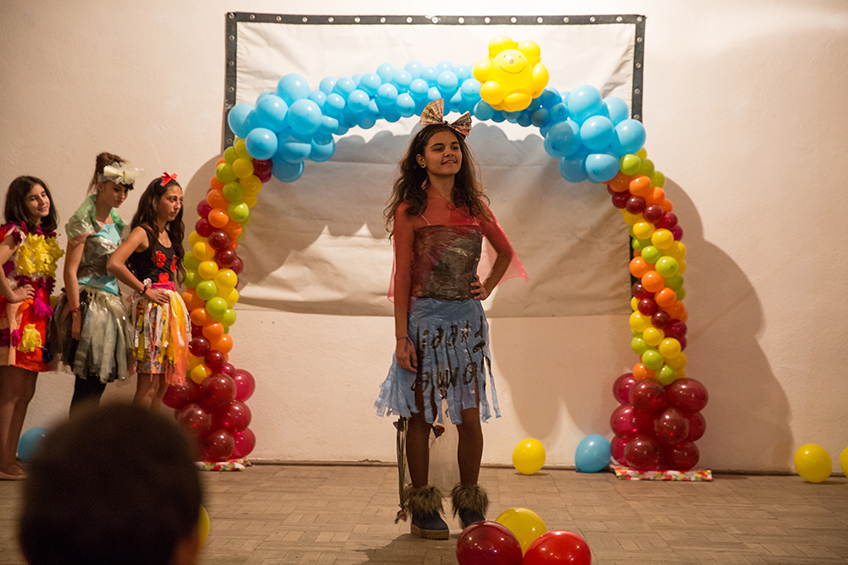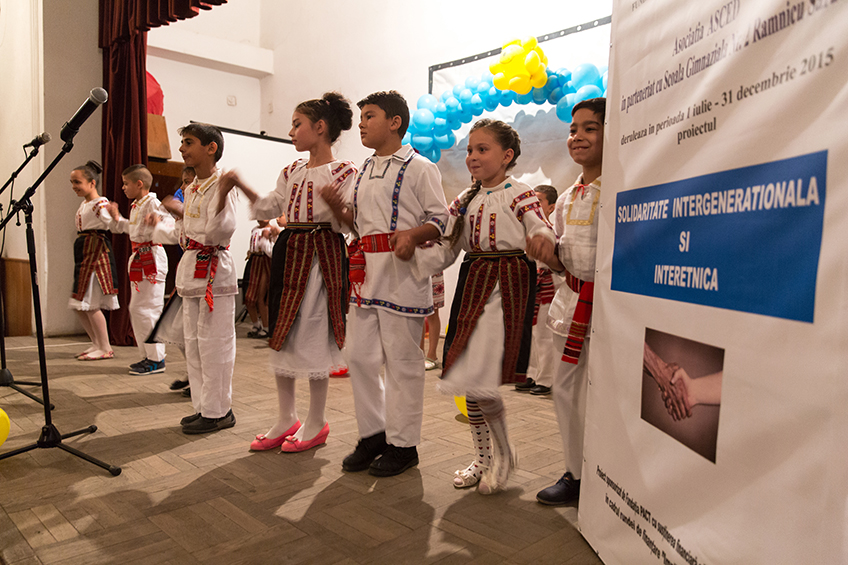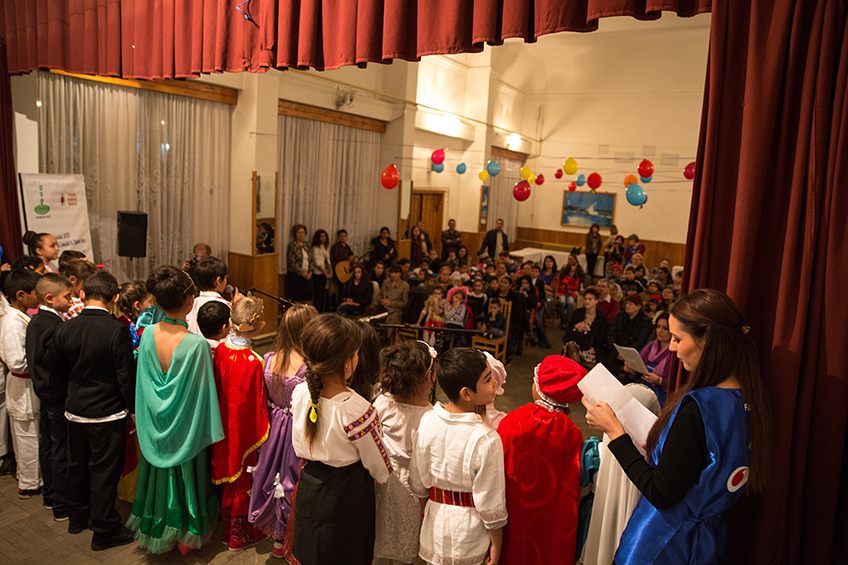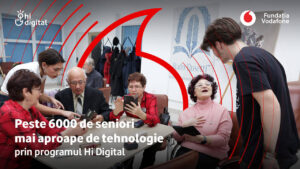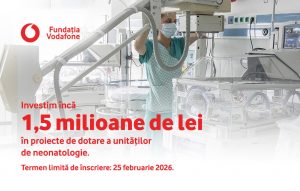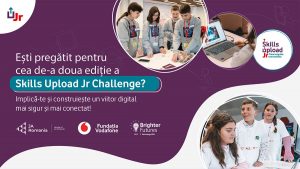A project from Râmnicu Sărat has revealed the difference a few hours of weekly volunteering can make in the lives of several children with high school dropout risk and old people living on their own.
by Gabriela Pițurlea
The Middle School no. 2 in Râmnicu Sărat is the kind of school where you fit in without feeling overwhelmed when you’re little, but after you get older, it feels like a doll house. The main building is pink, it has one floor and a courtyard which invites the children to play in the sunlight. From September 2015 until February 2016, 25 of its students benefited from an afterschool program and a warm lunch, on Wednesdays and Thursdays. Children aged 6 to 12 , with high school dropout risk due to their financial situation, stayed for 2-2.5 more hours in school. They did their homework but also had extracurricular activities: collage, painting, music, traditional dances or acting. 22 members of the teaching staff from the preschool, elementary and middle school level got involved as volunteers and divided their hours with the children and their work into groups, so that the afterschool program could work. „Knowing their struggles, it was very easy to get involved. They come from severely underprivileged families. They are very poor, they have no shoes, no clothes, no food. As we are from this neighbourhood, we have to face such problems,” says Florentina Poșircă, an elementary school teacher at the school, for the past 10 years.
Over 50 percent of the students are Romani, most of them from a nearby neighbourhood, Alecu Bagdad. „This comes with a stigma of troubled children”, the principal claims. Some of the parents left to work abroad and many of them come from families on social benefits. Due to the constantly decreasing number of registrations, the school is faces the threat of being closed (if the number of students falls under 300, it shall undergo a merger). And the fact that more and more parents prefer to send their children to School no. 1, which is bigger and considered the best in town, is also not helping.
Cornelia Berteșteanu, the president of the Association for Solidarity, Culture, Education and Development (ASCED), is an elementary school teacher at School no. 1, but has also taught one year at no. 2. She knew the people, but also the problems of the community in Alecu Bagdad, and she knew that the tiny school needed help in order to increase the chances to education of the students she already has and to improve the perception of the parents in Râmnicu Sărat. This is why, together with her husband, Cristian, she came up with the idea of an afterschool. The project for which they applied for funding from the Foundations PACT and Vodafone România had two goals – the development of their volunteering program for the elderly and a one semester long afterschool –, united by the idea that retired people could become in turn volunteers, sharing their knowledge with the children from School no. 2, and the children could organize small events, to take the elders out of their homes every now and then. (Most of the beneficiaries, the Berteșteanu family claims, did not feel comfortable sharing their experiences, however, some of them did. One colonel spoke to the children about war and patriotism, while several teachers taught them songs in English.)
As a daughter of an elementary school teacher, Cornelia had always looked for constructive methods to spend her free time, after her daughters moved to Bucharest. She also has a Master’s degree in Educational Management, and, along with her husband, she was also a POSDRU project reviewer. Reviewing hundreds of complicated applications, she gained the confidence that she, in turn, could draft small projects.
She founded ASCED in 2014, with several of her co-workers, former students and their parents, a group gathered initially around the idea of helping retired teachers. Meanwhile, the idea expanded. „Our parents are old and in need of help,” says Cornelia „but living far away and emphasising with them, we thought we could help those closer to us.” She and Cristian had the example of their neighbour, father of the artist Valeriu Sterian, with whom they often spent time in the garden. He was financially stable and had help around the house, but his wife and children had died and he was alone most of the time. „We figured that the main necessity of an older person, who lives far away from his children, is the need to socialize and to talk.” They also thought of all the parents who remained in Râmnicu Sărat, a city with an aged and decreasing population, of how it must be like to live without the aid of a child. They also thought of the fact that it won’t be long until they will retire themselves. So they wanted to motivate the people in Râmnicu Sărat to give a helping hand to the elders near them. Since August 2015, upon the received funding, in the amount of RON 31.464, from the Foundations PACT and Vodafone România, 15 volunteers aged 18 to 50 were encouraged to get close to lonely pensioners that they know at least as acquaintances or neighbours from the building or neighbourhood, to spend time with them and help them with small grocery shopping trips. With the help of the funding, the association also bought 15 bicycles, which allow the volunteers to travel more easily for shopping purposes. The economist, Daniela Andrei, has increased the frequency of the visits she’s been paying for quite some time to Ileana Iosif, her former history teacher and street neighbour, who’s 62, a widow and lives alone. Daniela is 43 years old and for now she’s a 2nd year student at the Faculty of Mathematics, because she wishes to teach. She and her husband took Mrs. Iosif to the hospital when she needed to; they sometimes help her around the garden, take her to the doctor or do her grocery shopping. During the project, sometimes accompanied by her daughter, who’s in 9th grade, Daniela spent more time talking to her former teacher, about her achievements and her life, about her grandson, about the time when Daniela was her student. „Like Mr. Berteșteanu says,” Daniela, whose parents are over 80 years of old and live in a village near Râmnicu Sărat claims that „probably when crossing into the second part of your life, you feel the need to be around the elders, as you feel that, inevitably, you will get to walk in their shoes.”
***
Cristian Berteșteanu, who was in charge of the implementation, recalls that he attended at the school a rehearsal for a show at Casa Armatei, which made him nervous. He didn’t think, seeing all that chaos, that something significant will come out of it, yet he was pleasantly surprised of what the children managed to stage during the event attended by their parents, the volunteers and the elders involved in the project. The restlessness and lack of coordination were toned down a few weeks later, and the children who hadn’t really stood out in school revealed their talents.
The ASCED changed the little ones. Many of them ask „when will we come back to the project?”. A kid who used to skip school a lot now attends classes every day. Students from various grades and of various ages engaged in long lasting friendships. Sorin Mustățea, who has been a teacher at School no. 2 for the past four years, believes that if there were more and longer similar projects, they could have a significant impact on the communities having the children as members. When they were to return home, many of them would pass on the values and behaviours they learned in school, as Camelia Ceamă does, for instance.
Camelia (1st grade) and her brother Claudiu (3rd grade) have both attended the afterschool program. Their father died a year ago and they have nine brothers at home, but their mother, Vica, insisted that all her children go to school. She’s 44 years old, has graduated 8 grades at School no. 2, knows the teachers, knows that they care and they do their best with what they have. „I don’t want to praise them, but my children attend school all the time,” Vica says. „They rarely skip school and then, they argue with me. When they return home from school, they start to write, because they like it.” Ever since the project was initiated, I’ve seen small changes in Camelia and Claudiu, whether it was an unexpected drawing or a lesson she didn’t think they could manage on their own. She was very glad that ASCED also provided them with the opportunity to travel to Bucharest for the first time. „They’ve seen many interesting things, I don’t believe I would have been able to give them this opportunity. For them, it was an unforgettable experience.”
Camelia’s favourite game is to pretend she is a teacher: „I am the teacher and my brother, little nephew and cousin are the pupils. I teach my little brother and nephew, Cristina, how to write 1, 2. I make Claudiu and Mario, my 9 year old cousin, write sentences. And I also have a class book.” Camelia has a ton of memories regarding the project – the hours spent in school, drawing, making paper snowmen or singing, the trip to Bucharest, where she also met Santa. At the festivity from Casa Armatei, she was Lizuca from the stories She can’t remember the poem she recited then, but she remembers a song, that she timidly starts to sing, with a half smile on her face: „I like school, it may be weird. I like school, that much is true.”
This material was drafted in partnership with Decât o Revistă within the funding round Involved in My Community, which is part of the Investment Program for the Rural Area, conducted by the Vodafone România Foundation and the PACT Foundation. You can find more stories of involvement on the platform oameniisudului.com developed by the PACT Foundation.

